Mar 14, 2014
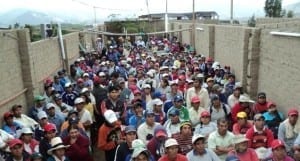
Camposol employees at a company assembly. Credit: Solidarity Center
Eighteen agricultural workers in Peru were detained during a work stoppage as they protested an agro-industrial company’s failure to uphold its collective bargaining agreement, according to the Camposol Workers’ Union (SITECASA). One union leader, Carmen Silvestre Rodríguez, was beaten by the national police, and the union’s general secretary, Felipé Arteaga, has been arrested, the union said.
SITECASA members began a peaceful work stoppage March 12 at the company’s facilities in Chao, a town in the country’s northern region. They are seeking the company’s compliance with several provisions in the region–wide collective bargaining agreement reached in July 2013, including resolution of daily production quotas for field workers, payment of annual profit sharing and provision of proper uniforms, footwear and meals for workers.
Field workers, who harvest avocados, mandarin oranges, mangoes and blueberries for export, currently must harvest 60 pallets before they receive their minimum daily wage of $11. According to the union, Camposol has conditioned its willingness to negotiate these points on the union’s retraction of an article in the collective bargaining agreement that provides employment stability (an indefinite contract) for workers with four years working for the company.
Camposol S.A. is Peru’s largest producer and exporter of non-traditional horticultural products like asparagus. Approximately 14,000 workers labor on Camposol’s vast plantations throughout the country. In 2012, the U.S. Department of State’s Human Rights Report cited Camposol for interfering with workers’ right to strike after the company failed to reinstate 250 workers dismissed for participating in a strike during collective bargaining.
Read the union’s full statement (Spanish).
Mar 11, 2014
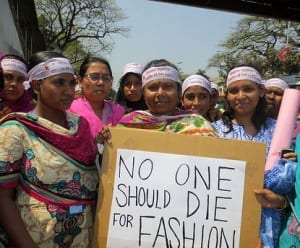
In Bangladesh, BCWS Executive Director Kalpona Akter rallied with garment workers on International Women Day. Credit: Solidarity Center
Hundreds of workers from multiple garment factories rallied in recent days at the National Press Club in Dhaka, Bangladesh, where they formed a human chain and demanded equal wages, equal rights and equal dignity for woman workers in the ready-made-garment (RMG) sector. The action was among many around the world throughout the past week as women workers and their allies commemorated International Women’s Day, held annually on March 8.
In Chittagong, where workers from 16 garment factories marched and rallied, Bangladesh Independent Garment Union Federation (BIGUF) Chittagong President Nomita pointed out that nearly all who took part were women.
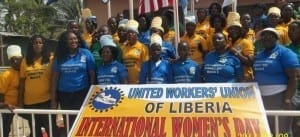
Liberian trade unionists celebrate International Women’s Day 2014. Credit: Solidarity Center
“I can’t imagine trade unions without women,” she said. Nomita urged RMG factory owners to fully implement maternity leave and establish child care centers in factories. In addition to BIGUF, other Solidarity Center allies taking part in International Women’s Day actions in the country included the Bangladesh Center for Worker Solidarity (BCWS), the Bangladesh National Garments Workers Employees League (BNGWEL), the National Garment Workers Federation (NGWF) and Sommilito Garments Sramik Federation (SGSF).
Elsewhere around the world, Solidarity Center allies marked International Women’s Day by celebrating, educating and mobilizing.
• In Tunisia, the Union Générale Tunisienne du Travail (UGTT) held a solidarity march for Palestinian women and repressed women around the world. The March 8 event took place on the main avenue in Tunis, the capital, and concluded at the UGTT center with music, cultural activities, poetry and an exhibit on the history of women’s activism in Tunisia. The event followed a roundtable on a comparative study of women’s rights in the country’s three constitutions.
• Moroccan union activists and members of the Confederation Democratique du Travail (Democratic Labor Confederation, CDT), took part in trainings that covered women’s legal rights and they also held artistic and cultural events, concluding with a ceremony honoring social activists and retired women. The Union Marocaine du Travail (Moroccan Workers’ Union, UMT) combined a celebration of Women’s Day with events marking the 59th anniversary of its founding congress. Later this month, UMT will host a roundtable discussion on the role of women in the union and strategies for broadening women’s participation in the union.
• The Border Committee of Women Workers (Comité Fronterizo de Obreras, CFO) held a mini-workshop for women participating in the Solidarity Center’s Gender and Women’s Empowerment for Action program in Coahuila, Mexico. The discussion focused on how International Women’s Day is more than a time for women to receive feel-good gestures like a flower or nice words on Facebook from the men in their lives. In Mexico, where women disproportionately bear the brunt of the country’s economic and social insecurity and violence, Women’s Day offers a space for women and girls to evaluate how far they’ve come and how much further they still must go to win equality with men and boys and achieve justice in all areas of their lives.
In Liberia, women and their allies held a parade to the United Workers Union of Liberia (UWUL) office, where they raised flags in recognition of labor partner organizations such as the United Steelworkers and IndustriAll that implement programs to help female unionists to become a strong force in Liberia.
• Across South Africa, the Solidarity Center joined with Labour for Rights for Women (LRW) campaign and the Labour Research Service (LRS) to host two events. In North West Province, the organizations convened health care workers, farm workers and domestic workers in a meeting with local civil society organizations and the South African Department of Health to discuss the impact of a new government health insurance plan, especially its impact on women workers. In Limpopo Province, the LRW held a training session for union gender coordinators, organizers and negotiators on maternity protection. The LRW, sponsored by the International Trade Union Confederation (ITUC), brings together South Africa’s labor federations to support improved respect for women’s rights at the workplace and their greater participation in union activities
Mar 10, 2014
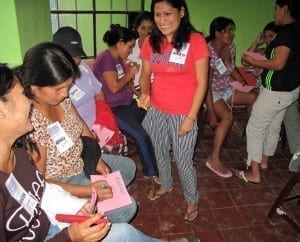
Violeta co-facilitated a workshop after learning skills from a Solidarity Center-sponsiored training. Credit: Samantha Tate
Rosa Pérez was brought to Lima, Peru, from the country’s Northern Sierra when she was a child to work as a domestic worker. As a young adult, she moved to the farming region of La Libertad to make her own way as an agricultural laborer. Thirty years, four children and five grandkids later, Perez has become a bold advocate for her co-workers. She encourages them to document and speak out about problems such as sexual harassment and inadequate safety and protection equipment and training.
Pérez, secretary of Women’s, Child and Adolescent Affairs of the Camposal Workers’ Union (Sindicato de Trabajadores de la Empresa Camposal), is a leader in a Solidarity Center program to empower women farm workers in Peru. Since 2009, the program, which includes the National Federation of Farm Workers (Federación Nacional de Trabajadores de la Agroindustria y Afines, FENTAGRO), has involved training and advocacy activities with unions representing workers in export-oriented agriculture.
The initiative gained momentum after Pérez traveled to São Paulo, Brazil, last year to participate in the Solidarity Center conference, “Women’s Empowerment, Gender Equality and Labor Rights: Transforming the Terrain.” There, she addressed more than 100 women from around the world and described working conditions for women farm workers in Peru and the actions that her union and FENTAGRO are taking to build a better life for women like her daughter, who works alongside her.
Pérez took the strategies she learned from activists at the conference to the farm worker federation’s leadership Friday, the eve of International Women’s Day. Along with the Solidarity Center, Pérez is recommending that La Libertad’s three unions meet with regional government officials and possibly employers to advocate for literacy programs targeting working women. She also plans to propose an awareness-raising campaign for men and women about sharing domestic and family care. The Solidarity Center has also been working with unions to strengthen their arguments for collective bargaining with employers in support of maternity and breastfeeding benefits that are codified in Peruvian law but not generally enforced.
Following the Women’s Empowerment conference, Perez worked with the Solidarity Center to identify 12 dynamic women from three export-oriented agriculture farms to take part in a Solidarity Center training this year geared toward building women’s confidence and strengthening their leadership skills so they can effectively advocate for women workers’ issues within their unions, their workplaces and their communities.
One of the workers who joined the training, Apolonia, is an elected officer in the Union of Agrícola Viru Workers (Sindicato de Trabajadores de la Empresa Sociedad Agrícola Virú, SITESAV). She grows and harvest fruits and vegetables as part of Peru’s export-agriculture industry, which, in 2013, generated $33 million in exports to the United States. She advises her fellow co-workers, especially young women, about how to stay healthy and build strong families while working between 12 hours and 14 hours a day and earning an average daily wage of $12.
Apolonia and other participants in the two-day training discussed how they can improve workplace safety and other issues and shared their dreams about bettering their workplaces, unions and households.
Two weeks after the leadership training, nearly all of the women who participated in the workshop, including Violeta and María Luna, who had been reluctant to speak in public, co-facilitated small workshops with groups of their peers using the new techniques they learned from the Solidarity Center training, including public speaking and one-on-one-contact to encourage self-confidence and participation.
The La Libertad network of women farm workers now has a compact disk with the stories of 32 Peruvian women leaders they can share in small study circles or at worker assemblies and when training other groups of women. It is the beginning of a much longer process that already has helped a group of powerful women to find their voice and begin to use it.
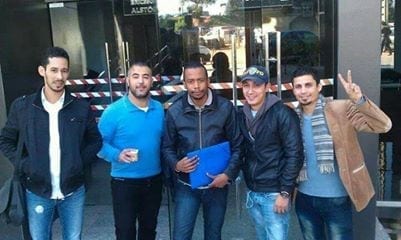
Mar 7, 2014
Five workers fired from their jobs last month at a call center in Casablanca, Morocco, are receiving strong support from their co-workers and their global union movement. (Read more from Labour News Network.)
When the five operators reported to work February 13, they were met by a court bailiff and informed they had been fired. The action came days after the workers formed a union with the Moroccan Labor Union (Union Maroccaine du Travai, UMT), one of the country’s oldest trade unions. (You can support the five fired workers by signing a petition launched in partnership with the Union Marocaine du Travail (UMT) and UNI Global Union.)
Per Moroccan law, the workers had first notified government officials that they had formed a union and then notified their employer after receiving administrative recognition. Although freedom of association is a fundamental human right guaranteed by Morocco’s Labor Code and the country’s constitution, the workers now must take their case to court.
“The situation is catastrophic. This sector is not regulated by social dialogue. There is a lack of collective agreements and bargaining rights,” said Mohamed El Ouafi, executive board member of the UMT, and national coordinator of Call Center Workers. He told the Moroccan news publication, La Libération, that most employees live their lives in constant fear of being dismissed for lack of social protection.
Co-workers of those fired held a sit-in at the Ministry of Employment and Social Affairs and have waged multiple rallies in support of the men. The AFL-CIO sent a letter to Moroccan Prime Minister Abdel-Ilah Benkirane urging the government to uphold the country’s constitutional guarantees of labor rights.
The French-owned Total Call operation offers educated and skilled working women and men much-needed jobs—but as the AFL-CIO wrote, the government must send “a firm message to employers that respect for the law is mandatory.”
Find out more about the five workers and the Moroccan call center campaig
Mar 7, 2014

Oretha Tarnue, vice president of the United Workers Union of Liberia (UWUL). Credit: Tula Connell/Solidarity Center
Each day this week leading up to International Women’s Day March 8, the Solidarity Center will highlight an example of how women and their unions are taking action to improve women’s lives on the job, in their unions and in their communities.
Oretha Tarnue, vice president of the United Workers Union of Liberia (UWUL) and a former domestic worker, is spearheading a drive in her country to organize domestic workers who, like their counterparts elsewhere, are routinely exploited by their employers.
In Liberia and in other countries, the overwhelming majority of domestic workers are young women who view the work as an opportunity to earn a living, but too often find themselves vulnerable to abuses—from low wages and long hours to physical and sexual abuse and human trafficking.
Tarnue, who is also a lead coordinator for the Domestic Workers Union of Liberia (DOWUL), says the workers, mostly women, are paid between $21 and $50 per month, which is barely enough to buy a bag of rice. The country’s minimum wage is $2 a day.
Solidarity Center staff spoke with Tarnue about the challenges involved in connecting with domestic workers to help them understand their rights as workers, join together to improve their working conditions and convey to lawmakers and the public that domestic workers perform real work, and have the same rights as and deserve labor law coverage equal to all other wage earners.
Solidarity Center: How did you get involved with the domestic worker union?
Tarnue: I thought there was a need to organize domestic workers. I have worked as a domestic worker and in our labor laws, domestic workers are not (recognized). We went from home to home and other places, like hotels, where domestic workers are not recognized, and we began to talk to people. (With) the Solidarity Center and the United Steelworkers (USW), we had a training where we selected domestic workers from different communities. We had a good training that led those coordinators to go out and organize and recruit members.
Solidarity Center: What was your experience as a domestic worker?
Tarnue: There’s no scope of work, there’s no term of reference. Domestic workers’ contract is a verbal contract and domestic workers are not (recognized) under the labor law so they are at the discretion of the boss.
Solidarity Center: How do you reach out to domestic workers?
Tarnue: We go out and speak to workers at their workplaces or meet them during their breaks of off hours. We are able to teach them at the level they’ll understand. Teach them their human rights, their physical rights, their moral rights. The basis of our training to domestic workers is to know their rights as human beings. They are entitled to their human rights, and we teach these things to them.
Solidarity Center: Has all this made a difference?
Tarnue: It has made a difference because, as we speak, our 30 coordinators (who are domestic workers) have been able to (challenge) their own bosses.
Solidarity Center: Really?
Tarnue: Yes. Their own bosses! This comes from the Solidarity Center and USW training! We tell them to not be violent, not be rude, but you can peacefully engage your boss. Access the boss’s’ leisure time and discuss issues relating to work time, to terms of reference, scope of work, wages. Lay them down one at a time and go into discussion. These 30 coordinators have been able to increase their wages just by having a discussion with their bosses. This lets us know that the training has been working.
Solidarity Center: In the next five years, what do you envision for DOWUL?
Tarnue: We are 100 percent optimistic that domestic workers are going to be fully unionized and (added) into Liberia labor law and a collective bargaining agreement is going to be done for the domestic workers. That’s our hope because domestic workers are like any other workers. They should be treated like any other worker on Liberian soil.






